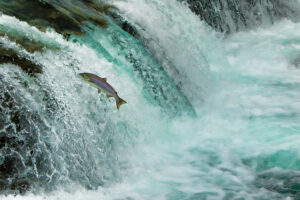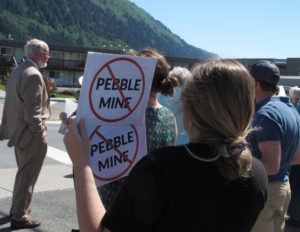Sexism and Sarah Palin
Marie Cocco writes that Sarah Palin's "intellectual emptiness" and "demonstrably poor judgment" should not excuse the "sexist cant that Palin has been subjected to since she burst onto the national scene" Eugene Robinson, however, finds that the fear of "being painted as elitist and sexist" has perpetuated the myth that Palin is "a substantial figure whose presence on the national stage is anything but a cruel, unfunny joke" Read on and decide for yourself.
Marie Cocco writes that Sarah Palin’s “intellectual emptiness” and “demonstrably poor judgment” should not excuse the “sexist cant that Palin … has been subjected to since she burst onto the national scene.” Eugene Robinson, however, finds that the fear of “being painted as elitist and sexist” has perpetuated the myth that Palin is “a substantial figure whose presence on the national stage is anything but a cruel, unfunny joke.”
For a third take, skip down to Ruth Marcus’ excellent column on the subject.Excerpt from “A Trashing as Old as Suffrage” by Marie Cocco:
Almost as soon as she’d finished her breakthrough speech at the Republican National Convention, one columnist for the liberal online magazine Salon called Palin a “dominatrix” and a “pinup queen,” referred to her “babaliciousness” — and described her convention address as having been charged with enough sexual energy to give the partisan crowd a “collective woody.” Another Salon columnist described Palin as a “Christian Stepford wife in a ‘sexy librarian’ costume” who was, for the most ideological Republicans, a “hard-core pornographic centerfold spread.”
Palin early on was called “Stepford Barbie” and “Caribou Barbie” — terms used even by highbrow commentators who found it acceptable to liken Palin to the impossibly proportioned fashion doll. The Barbie epithet marked Palin as an object of sexualized fashion fascination well before it came to light that the vice presidential nominee had used Republican Party funds to buy an expensive campaign wardrobe.
When did such a savage strain of sexism become acceptable public discourse?
Why does the same combination of bemused condescension and uninhibited vitriol that the media of a century ago showed toward the suffragists persist today?
Excerpt from “Don’t Cry for Me, Alaska” by Eugene Robinson:
There are basically two reasons why the political class and the commentariat continue to speak and write about Palin as if she were a substantial figure whose presence on the national stage is anything but a cruel, unfunny joke. The first is fear — not of Palin and her know-nothing legions, but of being painted as elitist and sexist.
From the beginning, Palin has been a master at maneuvering her critics into this trap. Like most Americans, she didn’t go to an Ivy League school; like most women, she deals every day with the challenges of juggling work and family. She highlighted these aspects of her biography, then used them to portray herself as a victim whenever anyone had the temerity to criticize anything she said or did. The most recent illustration is what she posted on her Facebook page last weekend on the reaction to her announced resignation:
“How sad that Washington and the media will never understand; it’s about country. And though it’s honorable for countless others to leave their positions for a higher calling and without finishing a term, of course we know by now, for some reason a different standard applies for the decisions I make.”
What is she talking about? Who are these “countless others” who supposedly have made the same decision to abandon governorships for no credible reason? The names don’t come rushing to mind. Why is any criticism of Poor Little Sarah the result of the “different standard” that mean old “Washington and the media” always apply? Because blaming her favorite alleged persecutors allows her to ignore the bewildered reaction from her constituents in Alaska who are stunned and mystified at her decision to skip out.
Excerpt from “Bailout, Palin-Style” by Ruth Marcus:
It’s fair to say that I’ve been no fan of Palin’s since John McCain picked her as his running mate, and my estimation of her has only gone downhill from there. I think my hostility has to do with our shared gender: I’m anxious to see women succeed in the political arena, as elsewhere, and I think McCain’s cynical choice of Palin and her faltering performance since have served to set back that cause.
On the day she was announced as the vice presidential nominee, Palin gave a shout-out to Hillary Clinton’s campaign and added, “It turns out the women of America aren’t finished yet, and we can shatter that glass ceiling once and for all.” Yes we can, but Palin hasn’t helped.
This latest twist in the Perils of Palin soap opera only makes matters worse. The unconvincing explanation combined with refrigerator-magnet wisdom — “Don’t explain: Your friends don’t need it and your enemies won’t believe you anyway” — underscores the image of women unable to withstand the heat of political pressure. The notion that this is some kind of “brilliant” (Mary Matalin) or “crazy like a fox” (Bill Kristol) move strikes me as ludicrous.
If fellow Gov. Mark Sanford proved anything, it’s that a male politician can be as flaky and overemotional as any woman. So is it unfair that Palin’s performance would reflect poorly on other female politicians? Of course. But Palin’s move — not retreating, she said, but “advancing in another direction” — is no advance, for her or any other woman.
Your support matters…Independent journalism is under threat and overshadowed by heavily funded mainstream media.
You can help level the playing field. Become a member.
Your tax-deductible contribution keeps us digging beneath the headlines to give you thought-provoking, investigative reporting and analysis that unearths what's really happening- without compromise.
Give today to support our courageous, independent journalists.






You need to be a supporter to comment.
There are currently no responses to this article.
Be the first to respond.